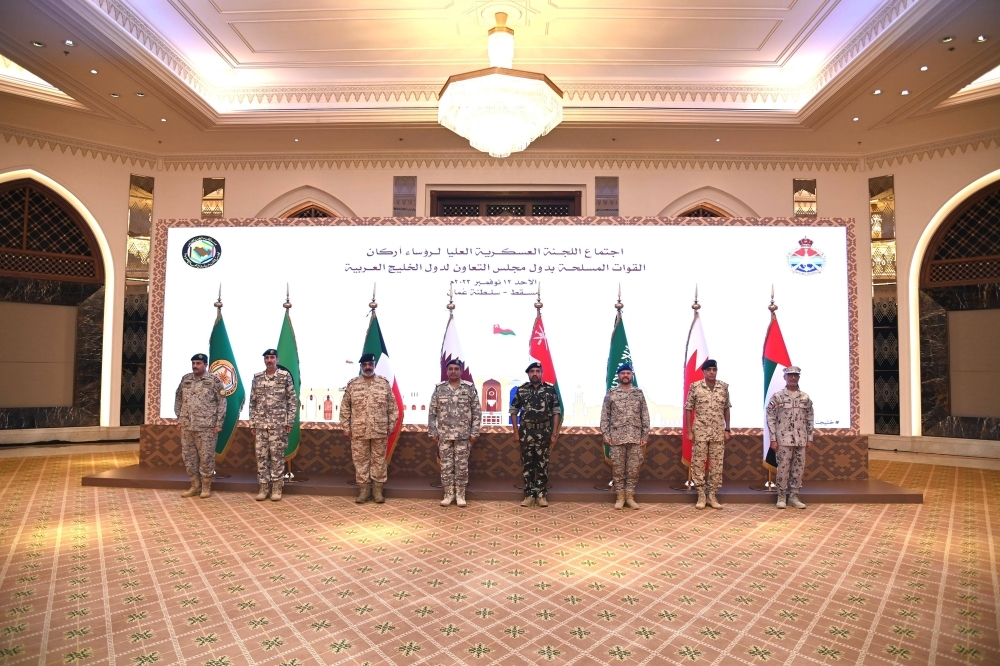In this connection, on Sunday the summit of the (P) GCC Supreme Military Committee of Chiefs of Staff of the Armed Forces was held in the Omani capital Muscat.
In the meeting, a number of issues related to boosting the existing cooperation among the member states in military areas was discussed by their army chiefs.
A statement published by the bloc suggested that “this meeting is a continuation of the process of joint military action and strengthening the aspects of constructive cooperation in any issue that develops the aspects of mutual dependence and integration between the armed forces of the (Persian) Gulf Cooperation Council countries.” The attendees also stressed the commitment to deepening of knowledge and expertise in security and strategic studies to effectively address the developing challenges.
The final statement also emphasized that this meeting is a sign of the collective efforts of the bloc’s countries to develop a unified approach to regional security and strategic cooperation.
This claims come as the Muscat meeting was held only a few days after the joint meeting of Islamic countries and Arab League aimed at stopping the Israeli war on Gaza and ending the crisis in the besieged Palestinian region, where the Arab and Islamic leaders signed a statement in which they said that Gaza war poses a big security threat for the regional peace and stability and called on the United Nations Security Council as the most important international security reference to take immediate actions to stop the Israeli bombardment and crimes in Gaza.
In fact, the non-observability of the political stances of the heads of the (P) GCC in composition of a strategy of security and defense cooperation and understanding the regional environment’s common threats in the bloc’s agreements can only demonstrate the difference in the stated and practical positions of this bloc. This is a reality that shows itself in the failure of the (P) GCC and Organization of Islamic Cooperation (OIC) in the last week’s Riyadh meeting to take practical actions to protect the Palestinians and stop the war.
The (P) GCC agreements usually focus on security or economic coordination, and meanwhile, the cornerstone for the establishment of the bloc was an intention to create a balance in response to the security vacuum in the Persian Gulf during the great military tensions and security challenges of the early 1980s. The peace treaty between Egypt and Israel in 1979 and the Islamic Iranian revolution, which caused Saddam Hussein’s war on Iran, created security concerns among the Persian Gulf countries, and in the meantime, the US played an important role in the formation of this bloc to protect its interests in the region and counter the Islamic Revolution that abolished pro-Western monarchy in Iran and installed an Islamic anti-imperialist system.
The (P) GCC, by establishing the Island Shield Force in 1984 as the core of joint military cooperation among member countries, addressed the concept of collective security, and the first significant operation of this force was in 2011 when it was deployed to suppress popular pro-democratic uprising of the Bahrainis. This comes while since the establishment of this force, West Asia has witnessed numerous wars and disputes, and at all of these wars the Israeli occupation of Palestine has been the spark. Here is a list of them: The Six-Day War in 1967, the Yom Kippur War in 1973, and other events such as the First and Second Intifadas in 1987 and 2000 respectively, the 2006 Lebanon 33-Day War, and the Gaza wars in 2008, 2014, and 2021.
Many of these wars have borne deep geopolitical consequences. In the Six-Day War, for example, Israeli forces seized control of the West Bank, Gaza Strip, Syria’s Golan Heights, and Egypt’s Sinai Peninsula. Even after signing of the peace treaty between Egypt and the Israel in 1979, parts of the Sinai desert, the Syrian Golan Heights, and parts of Jordan remained under Israeli occupation.
Under a state of strategic silence, the Cooperation Council states have declined to consider the Israeli occupational policies as a threat to regional security and stability, and some of these countries even established secret and then open relations under normalization deals with Tel Aviv, removing Israeli threat from their security and military doctrine and even envisioning Israel as part of their future regional coalition.
The deprioritization of the Israeli threat in the security and defense policies of the (P) GCC should not be reduced to isolationism or concentration of this bloc on the internal environment because firstly, due to the strategic enmity of Iran with Israel, any Arab-Israeli coalition will unleash security challenges to the Persian Gulf. Secondly, the experience of internal crises of Arabian Peninsula like Yemen war or the 2017 Qatar blockade by a number of Saudi-led countries and also the bloc’s incapability to adopt a common policy has proven that these countries have even failed in definition of the threats to the Peninsula’s internal security. Thirdly, we see the massive intervention of the members of the bloc and their engagement in a geostrategical competition in Arab geography like in Syria, Sudan, Yemen, Lebanon, and Ethiopia’s Tigray region.
Therefore, it seems that addressing security and defense
strategies in Muscat meeting while turning a blind eye to the Israeli
security threats amid Gaza war, whose possible expansion into a regional
conflict is not ruled out, is indicative of the wide gap between the
words and actions of the Cooperation Council. Actually, the meeting very
soon revealed the Persian Gulf rulers turning their back to the
Palestinian people.
/129

